[et_pb_section fb_built="1" admin_label="section" _builder_version="4.16" global_colors_info="{}"][et_pb_row admin_label="row" _builder_version="4.16" background_size="initial" background_position="top_left" background_repeat="repeat" global_colors_info="{}"][et_pb_column type="4_4" _builder_version="4.16" custom_padding="|||" global_colors_info="{}" custom_padding__hover="|||"][et_pb_text admin_label="Text" _builder_version="4.16" background_size="initial" background_position="top_left" background_repeat="repeat" global_colors_info="{}"]
Every year on the third Thursday in April, the world celebrates International Girls in ICT Day. Girls in ICT Day is celebrated to raise awareness about the importance of promoting girls' participation in the field of Information and Communication Technology (ICT) using strong female role models in ICT-related fields and science, technology, engineering, and mathematics (STEM) careers.
Like many regions, Africa faces a significant gender gap in the ICT sector. Girls in ICT Day raises awareness about this gap using role models to encourage girls to consider careers in technology, thereby helping to address disparities in access to and participation in the ICT industry. According to ITU, Digital technologies are an essential pathway to gender equality and empowerment of all women and girls. Achieving the United Nations Sustainable Development Goals (SDGs) will not be possible until we close the digital gender gap.
Africa's economy is increasingly reliant on technology and digital innovation. Encouraging more girls to enter the ICT sector helps to build a skilled workforce capable of driving innovation and economic growth in the region.
This year, we have put together a digital campaign that features voices of leading women in ICT drawn from National Regulatory Authorities (NRAs) and iPRIS partner organisations across Africa.
2. Dr. Caroline Wamala-Larsson (Director of SPIDER)
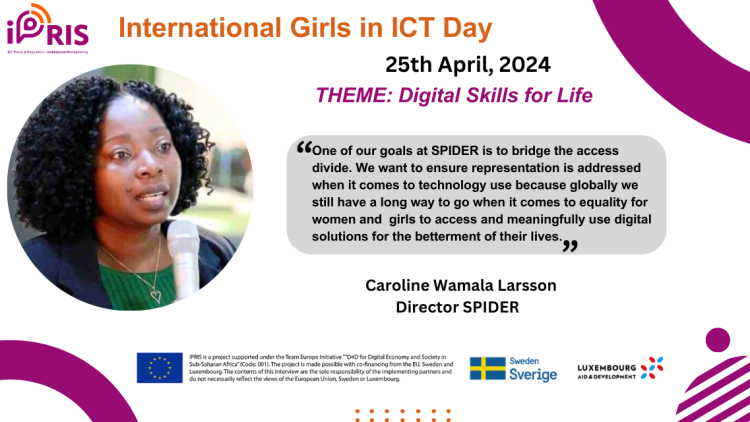
3. Dr. Emma Anna Otieno (Deputy Director, Communications Authority of Kenya)
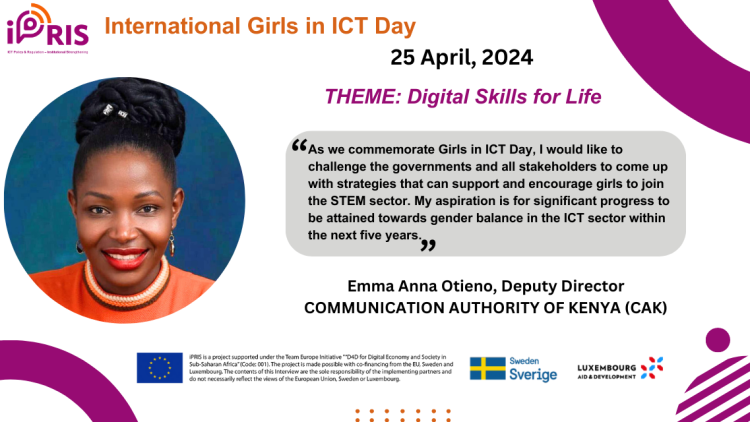
4. Ms Minenhle Rollaine Masuku (Quality Services Engineer Eswatini Community Commission (ESCCOM)
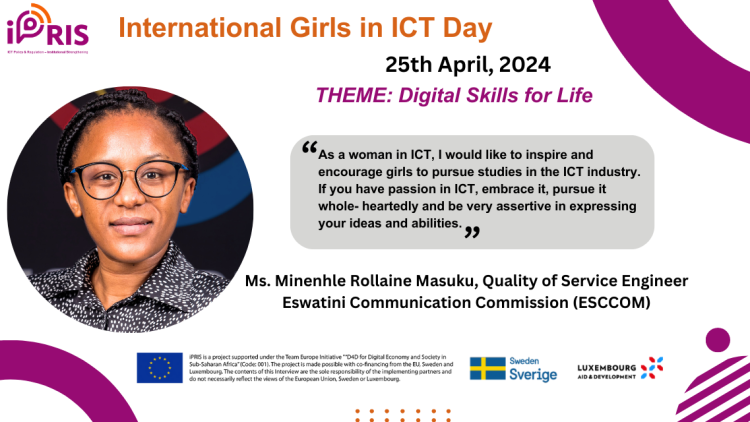
5. Dr. Katja Sarajeva (Program Manager ITP Network and Researcher at SPIDER)
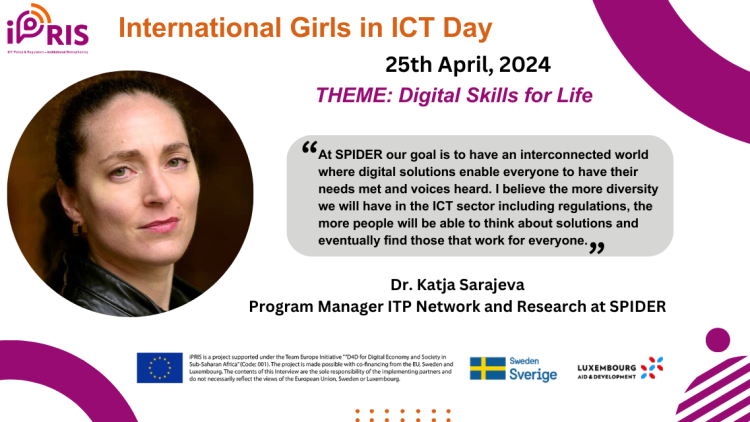
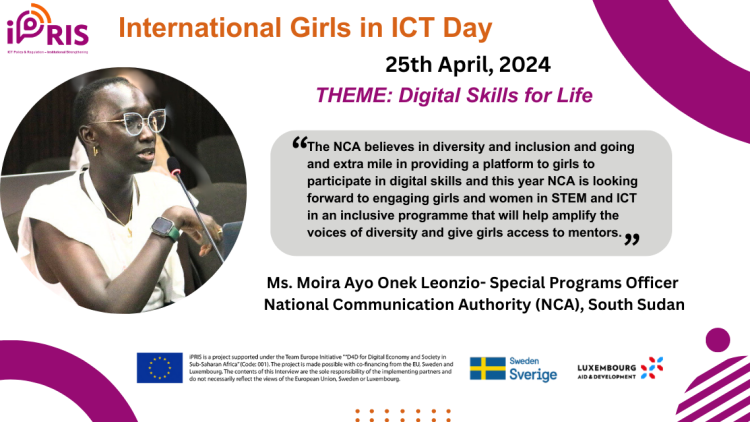
The role of iPRIS
ICT Policy & Regulation – Institutional Strengthening (iPRIS) contributes to bridging the digital divide by boosting the capacities of African telecommunications regulatory bodies. Targeting 43 countries in Africa, iPRIS aims to enhance inclusive digital connectivity and drive social and economic prosperity using ICT.
iPRIS is funded by the European Union, Sweden, and Luxembourg as part of the Team Europe Initiative “D4D for Digital Economy and Society in Sub-Saharan Africa” (Code: 001). The project aims to provide inclusive peer-to-peer capacity-building for African National Regulatory Authorities and Regional Regulatory Organisations, recognising the significance of ICT policies and regulation in promoting digital inclusion, equitable access to the Internet, consumer rights protection, and personal data safeguarding.
By highlighting the achievements of women in ICT and providing role models for young girls, the iPRIS girls in ICT campaign helps to break down notable barriers such as:
Addressing the gender gap
Efforts to address the gender gap in ICT in Africa include initiatives to promote STEM education for girls, provide digital skills training and mentorship programs, support women's entrepreneurship in the technology sector, and advocate for policies and practices that promote gender equality and inclusivity in the ICT workforce.
While progress has been made in some areas, there is still much work to be done to ensure that women and girls in Africa have equal opportunities to participate and succeed in the ICT sector. Continued investment in education, skills development, and gender-responsive policies and programs is essential for closing the gender gap and harnessing the full potential of Africa's digital economy. Girls in ICT Day encourages girls to pursue their interests in technology without fear of discrimination or bias.
For more media related queries/ more information about iPRIS
Please contact,
Ms.Edna Soomre - Project lead, iPRIS
Email: ipris@spidercenter.org
www.ipris.digital
[/et_pb_text][/et_pb_column][/et_pb_row][/et_pb_section]
The East African Communications Organization (EACO) is pleased to announce its 29th Annual Assemblies and the Extra-Ordinary Congress, which will take place in Nairobi, Kenya from 24th to 29th June 2024.
EACO Assemblies namely: Assembly of Regulators, Assembly of Postal Operators, Assembly of Telecommunications operators and Assembly of Broadcasting Operators meet every year. The Congress, which is the highest decision-making organ of EACO, meets every two years. However, an Extra-ordinary EACO Congress will take place on the sidelines of the Annual Assemblies in Nairobi, Kenya on 28th June 2024. The Extra-ordinary Congress will be dedicated to amendment of the EACO Constitution. The meetings of Assemblies will include two workshops that will discuss current technologies and key issues in the Postal and Communication sectors. This event will create unique opportunities for EACO members and stakeholders to interact, network, exchange and share experiences under the Theme: "Promoting Digital Transformation in the East African Region".
Delegates to the Assemblies will comprise of policy makers, legislators, regulators and operators/service providers in the ICT sector, the academia and consumers of ICT services in the East African region. Preparations for the events are well underway by the host (Communications Authority of Kenya), on behalf of the Republic of Kenya, together with EACO, who invites you to participate in these meetings. A formal invitation will follow in due course. Further details and information about the Assemblies and Extra-Ordinary Congress will be available on EACO website http://www.eaco.int and Communications Authority of Kenya (CA) website http://ca.go.ke by the end of April 2024. We look forward to your active participation in the above events!
For more information visit the EACO website
Every year, ITU and partners work together to inspire and encourage girls to pursue a future in ICTs towards bridging the gender digital divide. The aim is to encourage young women and girls to pursue their studies and careers in science, engineering, technology, mathematics, and other fields and help them achieve their dreams.
This year, the theme of Girls in ICT Day is ‘Leadership’. The global Girls in ICT Day celebration will be held on 25 April 2024 at the FEU Tech Innovation Center, Far Eastern University, Manila, Philippines in coordination and collaboration with the Department of Information and Communications Technology (DICT).
Borgarfjordsgatan 12, Kista,SWEDEN
Postal Address: Stockholm University, Department of Computer and Systems Sciences/DSV, SPIDER, P.O Box 1073, SE-164 25 Kista, Sweden
Copyright © 2024 iPRIS. All rights reserved.